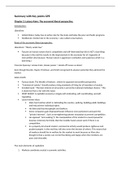Summary
Samenvatting Introduction to International Political Economy, 7th edition, ISBN: 9781315463438 Hf. 2 t/m 4= Part 1 of the book
- Course
- Institution
- Book
Summary of the three major perspectives we need to learn for the exam. So Liberalism, Mercantilism, and Structuralism.
[Show more]




